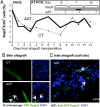alpha1-Antitrypsin monotherapy induces immune tolerance during islet allograft transplantation in mice
- PMID: 18852465
- PMCID: PMC2566995
- DOI: 10.1073/pnas.0807627105
alpha1-Antitrypsin monotherapy induces immune tolerance during islet allograft transplantation in mice
Abstract
Human pancreatic islet transplantation offers diabetic patients tight glucose control but has low graft survival rates. The immunosuppressive drugs that are administered to graft recipients lack the antiinflammatory benefits of corticosteroids because of their diabetogenic effects. The serum protease inhibitor alpha1-antitrypsin (AAT) possesses antiinflammatory properties and reduces cytokine-mediated islet damage. In the present study, diabetic mice were grafted with allogeneic islets and treated with AAT monotherapy (n = 24). After 14 days of treatment, mice remained normoglycemic and islet allografts were functional for up to 120 treatment-free days. After graft removal and retransplantation, mice accepted same-strain islets but rejected third-strain islets, thus confirming that specific immune tolerance had been induced. Explanted grafts exhibited a population of T regulatory cells in transplant sites. According to RT-PCR, grafts contained high levels of mRNA for foxp3, cytotoxic T lymphocyte antigen-4, TGF-beta, IL-10, and IL-1 receptor antagonist; expression of proinflammatory mediators was low or absent. After implantation of skin allografts, AAT-treated mice had greater numbers of foxp3-positive cells in draining lymph nodes (DLNs) compared with control treatment mice. Moreover, dendritic cells in DLNs exhibited an immature phenotype with decreased CD86 activation marker. Although the number of CD3 transcripts decreased in the DLNs, AAT did not affect IL-2 activity in vitro. Thus, AAT monotherapy provides allografts with antiinflammatory conditions that favor development of antigen-specific T regulatory cells. Because AAT treatment in humans is safe, its use during human islet transplantation may be considered.
Conflict of interest statement
The authors declare no conflict of interest.
Figures







References
-
- Couzin J. Diabetes. Islet transplants face test of time. Science. 2004;306:34–37. - PubMed
-
- Kobayashi N, Okitsu T, Lakey JR, Tanaka N. The current situation in human pancreatic islet transplantation: Problems and prospects. J Artif Organs. 2004;7:1–8. - PubMed
-
- Shapiro AM, et al. International trial of the Edmonton protocol for islet transplantation. N Engl J Med. 2006;355:1318–1330. - PubMed
-
- Bendtzen K, et al. Cytotoxicity of human pI 7 interleukin-1 for pancreatic islets of Langerhans. Science. 1986;232:1545–1547. - PubMed
-
- Barshes NR, Wyllie S, Goss JA. Inflammation-mediated dysfunction and apoptosis in pancreatic islet transplantation: Implications for intrahepatic grafts. J Leukoc Biol. 2005;77:587–597. - PubMed
Publication types
MeSH terms
Substances
Grants and funding
LinkOut - more resources
Full Text Sources
Other Literature Sources
Medical
Research Materials
Miscellaneous

